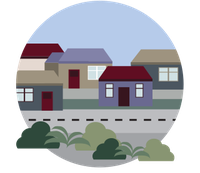Introduction
Houses are increasingly unaffordable in New Zealand. House prices rose just over 19% during 2020 and have continued to increase.1 Rents have also risen. People on lower incomes, Māori, and Pasifika peoples are particularly affected. This makes housing an important topic for many New Zealanders, and the Government spends a significant amount of public money on housing.
The Auditor-General’s mandate covers the use of public resources. We are interested in how housing and urban development initiatives are implemented, how well public funding is used, and what outcomes are achieved. We can comment on what public organisations are doing but we cannot comment on policy settings.
We have no mandate over the operations of the private sector. That is an important limitation because most of New Zealand’s building activity and housing assets is done or owned by private firms and private individuals.
Here, we summarise what we see and know about the housing situation in New Zealand and describe the role that our audit and other work plays.
We prepared this material to inform our work programme for 2021/22. We have published it because of the strong public interest in housing and urban development.
Contents
1 See the website of the Real Estate Institute of New Zealand (reinz.co.nz) for more information.





